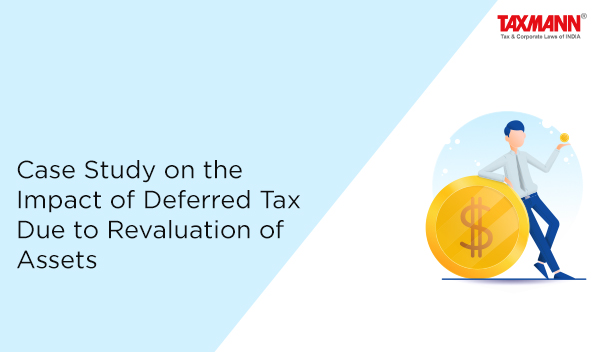Case Study on the Impact of Deferred Tax Due to Revaluation of Assets
- Blog|News|Account & Audit|
- 2 Min Read
- By Taxmann
- |
- Last Updated on 29 September, 2023

Ind ASs permit or require certain assets to be carried at fair value or to be revalued (see, for example, Ind AS 16, Property, Plant and Equipment, Ind AS 38, Intangible Assets and Ind AS 109, Financial Instruments). In some jurisdictions, the revaluation or other restatement of an asset to fair value affects taxable profit (tax loss) for the current period. As a result, the tax base of the asset is adjusted and no temporary difference arises. In other jurisdictions, the revaluation or restatement of an asset does not affect taxable profit in the period of the revaluation or restatement and, consequently, the tax base of the asset is not adjusted. Nevertheless, the future recovery of the carrying amount will result in a taxable flow of economic benefits to the entity and the amount that will be deductible for tax purposes will differ from the amount of those economic benefits. The difference between the carrying amount of a revalued asset and its tax base is a temporary difference and gives rise to a deferred tax liability or asset. This is true even if:
(a) the entity does not intend to dispose of the asset. In such cases, the revalued carrying amount of the asset will be recovered through use and this will generate taxable income which exceeds the depreciation that will be allowable for tax purposes in future periods; or
(b) tax on capital gains is deferred if the proceeds of the disposal of the asset are invested in similar assets. In such cases, the tax will ultimately become payable on sale or use of the similar assets.
This discussion involves a case study on the impact of deferred tax due to the revaluation of assets.
Click Here To Read The Full Story
Disclaimer: The content/information published on the website is only for general information of the user and shall not be construed as legal advice. While the Taxmann has exercised reasonable efforts to ensure the veracity of information/content published, Taxmann shall be under no liability in any manner whatsoever for incorrect information, if any.

Taxmann Publications has a dedicated in-house Research & Editorial Team. This team consists of a team of Chartered Accountants, Company Secretaries, and Lawyers. This team works under the guidance and supervision of editor-in-chief Mr Rakesh Bhargava.
The Research and Editorial Team is responsible for developing reliable and accurate content for the readers. The team follows the six-sigma approach to achieve the benchmark of zero error in its publications and research platforms. The team ensures that the following publication guidelines are thoroughly followed while developing the content:
- The statutory material is obtained only from the authorized and reliable sources
- All the latest developments in the judicial and legislative fields are covered
- Prepare the analytical write-ups on current, controversial, and important issues to help the readers to understand the concept and its implications
- Every content published by Taxmann is complete, accurate and lucid
- All evidence-based statements are supported with proper reference to Section, Circular No., Notification No. or citations
- The golden rules of grammar, style and consistency are thoroughly followed
- Font and size that’s easy to read and remain consistent across all imprint and digital publications are applied



 CA | CS | CMA
CA | CS | CMA
